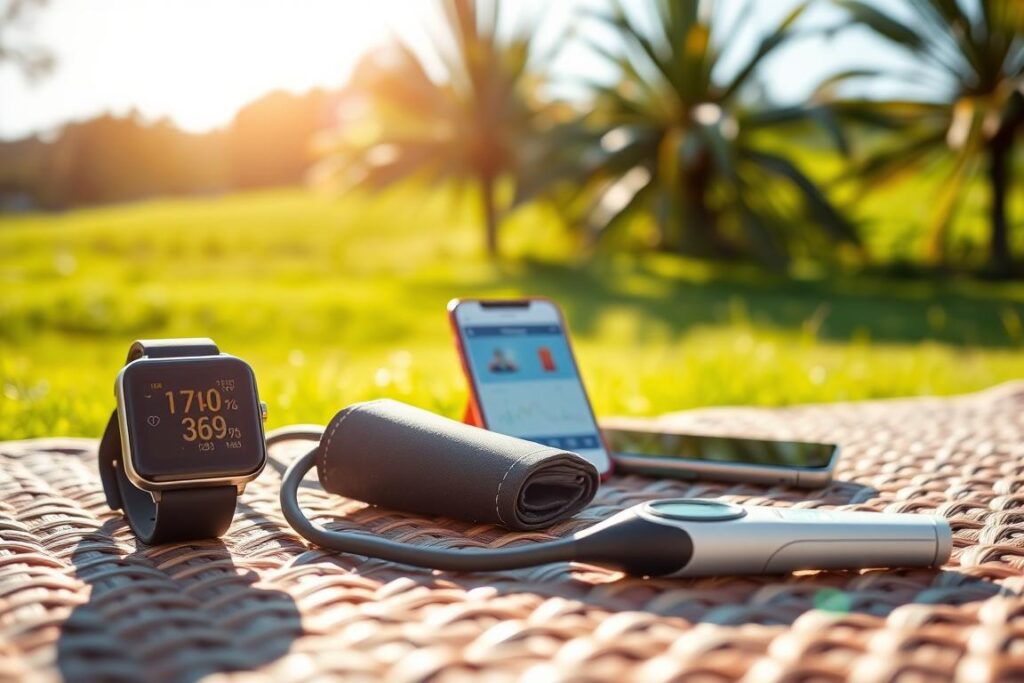As we step into the warm season, a key question arises: Can we manage our health as we manage our summer plans? For those with chronic conditions, the answer is yes. It’s about knowing how the heat affects their health.
It’s true that summer can worsen some conditions. So, it’s vital to take precautions. We’ll show you how to stay safe and healthy during this time.
We’ll give you important tips and strategies. These will help you stay healthy and active all summer long.
Key Takeaways
- Understand how summer weather can affect your chronic condition
- Learn simple precautions to stay safe in the heat
- Find out the best ways to manage your condition during summer
- Get tips on staying healthy and active
- Discover how to make the most of your summer despite your condition
Understanding the Impact of Summer on Chronic Conditions
It’s important to know how summer affects chronic conditions. When it gets hotter, people with chronic illnesses face more health issues. Understanding how heat impacts different conditions helps manage them better in summer.
How Heat Affects Different Chronic Conditions
Heat can significantly affect various chronic conditions. For example, heart conditions may strain more in the heat. Autoimmune diseases like lupus or rheumatoid arthritis can also flare up due to heat and humidity.
Some chronic conditions that can be affected by heat include:
- Cardiovascular diseases: Heat can cause the heart to work harder, potentially leading to complications.
- Autoimmune diseases: Heat and humidity can trigger or worsen symptoms.
- Respiratory conditions: High temperatures can exacerbate conditions like asthma.
- Skin conditions: Heat can cause skin irritation and exacerbate conditions like eczema.
Knowing these impacts is key to managing chronic conditions in summer.
Common Summer-Related Health Challenges
In summer, people with chronic conditions face several health challenges. These include:
| Challenge | Impact on Chronic Conditions |
|---|---|
| Dehydration | Critical for individuals with kidney disease or heart failure |
| Heat exhaustion | More severe in individuals with cardiovascular diseases |
| Sun exposure | Can cause skin damage and exacerbate skin conditions |
Why Special Summer Management is Important
Special summer management is key to avoid risks from heat and chronic conditions. By taking proactive steps, individuals can keep their health in check during summer.
Effective summer management includes knowing the heat’s impact on specific conditions, staying hydrated, managing medication, and adjusting exercise. It’s also vital to have an emergency health plan and make dietary changes to manage chronic conditions in summer.
Preparing Your Medication Regiment for Summer Weather
As summer gets closer, it’s key to check and tweak your medication plan. Some meds can raise the chance of heat sickness. So, talking to your doctor about your meds is a must.
Understanding Medication Risks in the summer is vital. Some meds, like diuretics and some antidepressants, can mess with our body’s temperature control or lead to dehydration. Knowing these risks helps us take the right steps.
We should review our medication list with our healthcare provider. This includes all meds, over-the-counter drugs, and supplements. Our doctor can tell us about risks and suggest changes if needed.
Adjusting Medication Schedules might be needed in summer. For example, some meds’ doses might change with more activity or heat. Drinking plenty of water is also key, as dehydration can worsen some meds’ effects.
We should also watch for heat sickness signs like dizziness, nausea, headaches, and tiredness. If we feel these, we should find shade, rest, and drink water. Severe cases might need a doctor’s help.
By being proactive with our meds, we can lower risks of chronic illnesses in summer. This, along with tips for managing chronic conditions, ensures a healthier and safer summer.
Essential Summer Hydration Strategies for Chronic Conditions
Managing chronic conditions in summer means focusing on staying hydrated.
Drinking water is just the start. It’s about understanding your body’s needs and knowing how to stay hydrated. You also need to know when you’re not drinking enough.
Creating a Personalized Hydration Schedule
Having a personalized hydration schedule is key. Drink water regularly, not all at once. Start with a glass in the morning, have water with meals, and sip all day.
- Drink water as soon as you wake up to rehydrate after a night of sleep.
- Have a water bottle with you at all times to remind you to drink regularly.
- Monitor your urine output; if it’s pale yellow or clear, you’re likely hydrated.
Best Drinks for Managing Chronic Conditions
Choosing the right drinks is important for hydration, even more so for those with chronic conditions. Water is best, but other drinks can help too.
Some good options include:
- Coconut water, which is rich in electrolytes.
- Herbal teas, which can provide hydration without the caffeine.
- Low-sugar sports drinks, which can be beneficial if you’re engaging in intense physical activity or experiencing excessive sweating.
Signs of Dehydration to Watch For
Knowing the signs of dehydration is vital, even more so for those with chronic conditions. Catching it early can prevent serious problems.
Look out for these signs:
- Dizziness or lightheadedness.
- Fatigue or weakness.
- Dark yellow or amber-colored urine.
- Rapid heartbeat or palpitations.
By recognizing these signs and acting early, you can better manage your condition in summer.
Adapting Your Exercise Routine During Hot Weather
Summer is here, and we need to change how we exercise to stay safe. It’s important to adjust our routines to avoid the dangers of hot weather.
Exercising with chronic conditions needs careful planning, even more so in the heat. We should avoid exercising during the hottest part of the day, which is usually between 10 am and 4 pm. This helps prevent heat-related illnesses.
Health guidelines suggest planning outdoor activities early in the morning or close to sunset for those with chronic conditions. This helps us avoid the worst of the heat and lowers the risk of problems.
Here are some key things to consider when changing our exercise routine for hot weather:
- Check the weather forecast to plan our exercise for cooler days or times.
- Choose indoor activities during extremely hot weather, like gym workouts or swimming.
- Wear light, loose-fitting clothes to stay cool.
- Drink plenty of water before, during, and after exercising.
Let’s look at some specific changes we can make to our exercise routines:
| Exercise Type | Adjustment | Benefits |
|---|---|---|
| Outdoor jogging | Change to early morning or evening | Avoid heat-related illnesses |
| Gym workouts | Keep the same routine | Maintain consistency, stay cool |
| Outdoor cycling | Shift to indoor cycling | Avoid heat exposure, reduce risk |
It’s also important to know the signs of heat-related illnesses. These include dizziness, nausea, headaches, and fatigue. If we feel any of these symptoms, we should stop exercising right away and rest in a cool place.

By changing our exercise routines for the hot weather, we can manage our chronic conditions well. This way, we can enjoy summer while staying safe.
Managing Chronic Conditions and Summer Heat: A Guide
Summer brings challenges for those with chronic conditions. It’s key to manage our health well.
Managing chronic conditions in summer heat involves several factors. These include our activities, environment, and health. We must plan carefully to avoid heat-related issues.
Staying indoors during the hottest part of the day is a simple yet effective way. Adjusting our daily routines helps us avoid heat.
Indoor Activity Alternatives
Instead of outdoor activities, try indoor ones. These can be just as fun and beneficial. Some ideas include:
- Reading books or journals
- Engaging in indoor exercises like yoga or stretching
- Practicing meditation or other mindfulness activities
- Participating in indoor hobbies like painting or crafting
These activities keep us engaged and help us stay physically and mentally well during summer.
Cooling Techniques and Methods
Using cooling techniques is vital for managing chronic conditions in summer heat. Some effective methods include:
- Using cooling towels or cooling packs to keep our body temperature down
- Keeping our environment cool by using air conditioners or fans
- Staying hydrated by drinking plenty of water or other cooling drinks
- Avoiding heat-generating activities like cooking or using heaters
By using these cooling techniques, we can reduce the risk of heat-related complications and stay healthy.
When to Avoid Outdoor Activities
Knowing when to avoid outdoor activities is key. We should avoid them during the hottest part of the day, usually between 11 am and 3 pm. Instead, choose cooler times like early morning or late evening.
By being mindful of our activities and making necessary adjustments, we can manage our chronic conditions effectively and enjoy the summer season.
Dietary Adjustments for Summer Disease Management
To handle chronic conditions in the summer, changing your diet is essential. As it gets hotter, our bodies need different nutrients to stay healthy. Boosting Immune System with Fresh Summer FareAdding fresh summer foods to your diet can really help your immune system. Fruits like berries, melons, and citrus are not only cool but also full of vitamins and antioxidants.
These help fight inflammation and oxidative stress linked to chronic conditions. Summer salads with leafy greens, vegetables, and lean proteinsalso offer important nutrients.
It’s also important to watch the air quality, as bad air can make breathing problems worse. Knowing the air quality index in your area and planning your outdoor time can help. Eating foods rich in omega-3 fatty acids, like salmon, and antioxidants, like tomatoes and bell peppers, can also help fight air pollution effects.
By choosing the right foods and paying attention to air quality, people with chronic conditions can manage their health better in the summer.
Creating an Emergency Summer Health Plan
Having a good emergency summer health plan can help a lot. It’s important to think about health risks that come with summer. We need to get ready for the warmer weather.
An emergency plan is not just for bad situations. It’s about taking care of your health during summer. This means knowing how to handle heat sickness, having your meds ready, and knowing when to see a doctor.
Building a Summer Emergency Kit
A summer emergency kit is key for your health plan. It should have important items like:
- Medications: Make sure you have enough of your meds. Also, keep a list of them, their doses, and your doctor’s contact info.
- First Aid Supplies: Have basic first aid stuff like bandages, antiseptic wipes, and pain relievers.
- Hydration: Include drinks or tablets that help keep you hydrated.
- Cooling Devices: Add cooling packs or a portable fan to keep your body cool.
Important Contact Information
Having the right contact info ready can save lives. Make sure to:
- Keep a list of emergency numbers, like your doctor’s and family.
- Save these numbers in your phone, including the emergency number.
- Have a written list of contacts in your emergency kit.
Warning Signs to Watch For
Knowing the signs of heat sickness is important. Look out for:
- Heat Exhaustion: Heavy sweating, pale skin, fast and weak pulse, nausea or vomiting, and dizziness.
- Heat Stroke: High body temperature, confusion, dry skin, rapid pulse, and possible loss of consciousness.
If you see these signs, get medical help right away.
By following these steps, people with chronic conditions can stay healthy in summer. This helps avoid heat-related problems.
Travel Tips for Those with Chronic Conditions in Summer
Planning summer vacations with chronic conditions requires extra care. The heat and humidity can make health issues worse. It’s important to stay safe and healthy while traveling.
Before you travel, talk to your doctor. They can help you manage your condition on the road. They might suggest changes to your medication or extra precautions. It’s wise to check in with your doctor and ask for tips to avoid health problems.
Here are some key things to think about when traveling with chronic conditions in summer:
- Pack essential medications: Make sure you have enough for your trip. Keep it in your carry-on to avoid losing it.
- Stay hydrated: Drink lots of water, even more in hot or humid places.
- Plan for your condition: Look up local healthcare and keep their info handy.
- Be mindful of your surroundings: Travel when it’s cooler and take breaks to rest.
- Keep your documents ready: Carry a card with your health info and contact numbers.
By following these tips, you can have a great summer trip. It’s also smart to research your destination. This helps you understand the local weather and health concerns.
Some more summer health tips for chronic conditions include knowing the signs of heat-related illnesses. This includes heat stroke and dehydration. Being prepared and careful can help you enjoy your trip while keeping your health safe.
Mental Health and Chronic Illness During Summer Months
Dealing with chronic conditions in the summer can be tough. It’s key to understand how it affects our mental health. We face extra stress from the summer, like enjoying the outdoors and handling the heat.
Coping Strategies for Difficult Days
It’s vital to have ways to cope on tough days. Keeping a routine helps us feel stable. Relaxation techniques like deep breathing or meditation can also help reduce stress.
Staying in touch with loved ones is another good strategy. Doing things we love, like reading or listening to music, can also help us get through hard times.
Finding Support and Resources
It’s important to find support and resources for our mental health in the summer. Talking to our healthcare providers can offer valuable advice. Looking into support groups online or in-person can also be helpful.
We can use online tools and mental health resources like therapy apps. These can be great for managing our mental health. It’s important to use these resources to take care of our mental well-being.
Special Considerations for Different Types of Chronic Conditions
Different chronic conditions need special care in the summer. We’ll look at what’s needed for each condition and offer tips for managing them well.
For those with heart conditions, summer heat is tough. The heat makes the heart work harder, leading to dehydration and serious issues. Drinking lots of water and avoiding hard activities in the heat is key.
Diabetes patients must watch their blood sugar in the summer. High temperatures and dehydration can raise blood sugar levels. It’s important to check blood sugar often and adjust medication as advised by a doctor.
Summer air can worsen respiratory issues like asthma or COPD. Staying inside when air is bad and using air purifiers helps. Following a doctor’s advice on managing respiratory health in summer is also vital.
| Chronic Condition | Summer Challenges | Management Tips |
|---|---|---|
| Chronic Heart Conditions | Heat stress, dehydration | Stay hydrated, avoid strenuous activities during peak heat |
| Diabetes | Fluctuating blood sugar levels, dehydration | Monitor blood sugar regularly, adjust medication as needed |
| Respiratory Conditions | Air quality issues, allergens | Stay indoors when air quality is poor, use air purifiers |
Managing chronic conditions in summer also means thinking about mental health. The heat and humidity can affect mood. Doing relaxing activities and staying in touch with loved ones can help.
Understanding the challenges of different chronic conditions and using specific management strategies can make summer healthier and more enjoyable.
Working with Healthcare Providers for Summer Management
Managing chronic illnesses in summer needs a team effort. Patients and healthcare providers must work together. As summer arrives, those with chronic conditions need to adjust their care plans.
When to Schedule Check-ups
Regular visits to healthcare providers are key, more so in summer. A pre-summer check-up can help tweak your treatment plan.
- Schedule a pre-summer check-up to review your current health status and adjust your treatment plan as needed.
- Consider additional check-ups during the peak summer months to monitor your condition and make any necessary adjustments.
It’s also important to be proactive about your health. If you notice any changes or have concerns, contact your healthcare provider right away.
Questions to Ask Your Healthcare Team
Being ready with questions can make your check-ups more useful. Here are some important ones to ask your healthcare team:
- What adjustments should I make to my medication regimen during the summer?
- Are there specific summer-related health challenges I should be aware of with my condition?
- What are the best strategies for staying hydrated and managing heat-related stress?
- Are there any new treatments or therapies that could help me better manage my condition during the summer?
By working closely with your healthcare providers and staying informed, you can enjoy a healthier, more enjoyable summer.
Technology and Tools for Summer Health Monitoring
Technology is now a big part of our lives. It helps us keep track of health issues during the summer.
There are many tools and technologies out there. They help with summer wellness for chronic conditions. Here are a few:
- Mobile apps that track your meds, how much water you drink, and your activity.
- Wearable devices that watch your vital signs and spot any problems.
- Telehealth services for online doctor visits and health checks.
These tools are great for staying healthy with chronic diseases in summer. They help you remember to take your meds or drink water. This stops dehydration.

Using these technologies, you can handle chronic illnesses in the summer better. You can enjoy the season while keeping your health in check.
Conclusion: Thriving with Chronic Conditions in Summer
Managing chronic conditions in summer needs a mix of strategies. We must stay hydrated, adjust our exercise, and work with our doctors. This ensures we’re well cared for.
For better summer wellness, we can tweak our daily habits. We can make a hydration plan, use cooling methods, and watch what we eat. These steps help us cope with the heat.
By using these tips and staying alert, we can handle chronic conditions in summer. It’s key to stay informed and proactive. This way, we keep our health up during the hot months.
So, we can live well with chronic conditions and make the most of summer. Let’s enjoy every moment of it.



